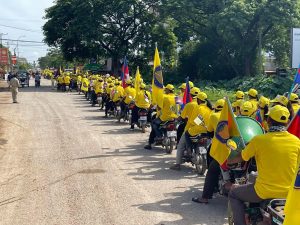Cambodians go to the polls on July 23 for an election that only Prime Minister Hun Sen and his Cambodian People’s Party (CPP) can win. But one outstanding question remains: Can the royalist Funcinpec party win any seats and end the country’s status as a one-party-state?
It’s a tricky question in a country where opinion polls are not allowed. Of the available forecasts CPP insiders have said they expect to win 92 percent of the 125 seats to be contested – and that was in February before the key opposition party was disqualified from contesting the poll.
The Candlelight Party (CLP) picked up more than 22 percent of the popular vote at last year’s commune elections and seemed assured of winning some seats at this general election, until it was ruled out by the National Election Committee for lodging incorrect registration papers.
Their absence has diplomats talking up Funcinpec’s chances. Some have suggested the party now led by Norodom Chakravuth should win at least two or three seats. One diplomat even said: “This might sound a bit out there but they can win anything between three and 15 seats.”
Perhaps. But recent electoral history has not been on Funcinpec’s side given what happened here after the CLP’s predecessor, the Cambodian National Rescue (CNRP), was outlawed by the courts in 2017 for plotting to overthrow the government.
Funcinpec was handed 41 of the 55 seats that had been won by the CNRP at the 2013 ballot when its leaders Kem Sokha and Sam Rainsy went tantalizingly close to winning the popular vote, in a result that shocked the ruling elites within the CPP.
Those 41 seats gave Funcinpec – then led by Norodom Ranariddh – a handy head start at the 2018 poll but the royalists – long plagued by allegations of corruption, greed, infighting, and putting their own interests before those of the people – simply bombed.
Funcinpec failed to win any seats. Of the 19 political parties that touted themselves as an alternative to the CPP, it did perform best, but still won only a paltry 5.89 percent of the overall vote, enabling the CPP to win all 125 seats in the National Assembly.
A new era had dawned. Hun Sen reveled in absolute power but Cambodia’s status as a one-party-state and the repression that followed prompted an exodus of Western businesses and upset Western nations and civil society activists who complained bitterly about an erosion of democratic space.
Many of those Western countries – the United States, Australia, France, Britain, and the European Union – had backed Cambodia and Hun Sen during its post-war reconstruction in what was often a volatile relationship. But adding insult to injury in recent years was the way Phnom Penh snubbed and insulted the West in favor of China.
Beijing’s largess and investment bang delivered motorways, skyscrapers, and cash cows like casinos, fed by more than a million tourists a year in the latter half of the 2010s. But those days ended with the pandemic, and despite promises that the Chinese will return, they have not.
Cambodia’s economy is not in great shape. The government is in dire need of foreign investment to meet the demands of a rapidly modernizing society where 65.3 percent of the population is under 30 years of age. Hun Sen has promised 300,000 new jobs over the coming year.
And the era when this country tugged on the heartstrings of the West, during and after the diabolical war years – and a guarantee of foreign aid and investment – is long gone.
Cambodia’s biggest obstacle remains its status as a one-party-state.
That status makes it difficult for democratically elected politicians to justify the spending of taxpayer dollars on a country run by a party with a solid track record in shutting down independent media and jailing opposition politicians – and is soon to leave the ranks of least developed nations.
Despite its past sins – and there were many – Funcinpec is the only opposition political party capable of winning any seats at this election and end Cambodia’s unwanted status as a one-party-state. Some semblance of democracy can only help.

































